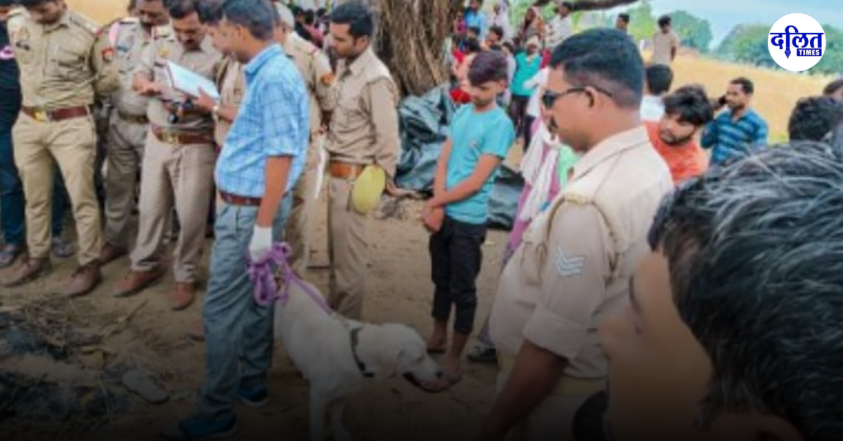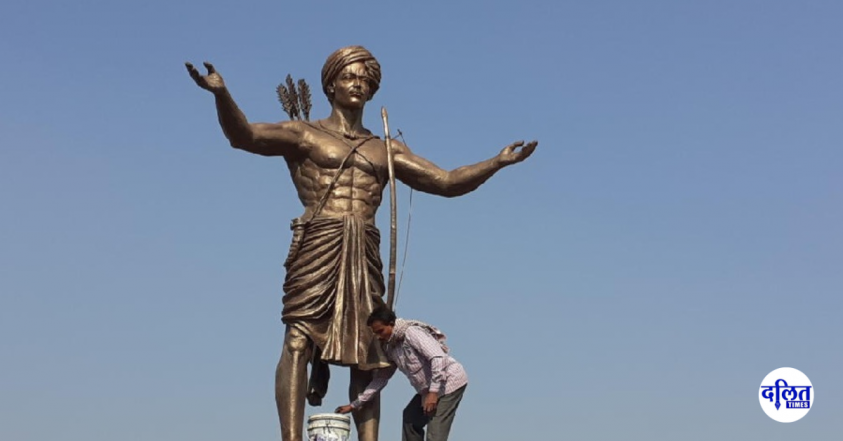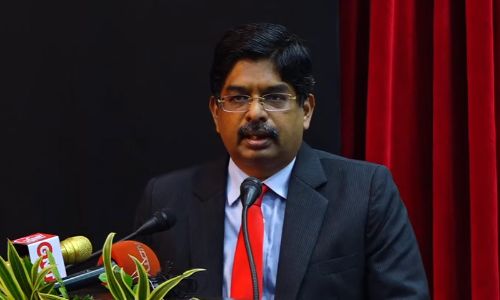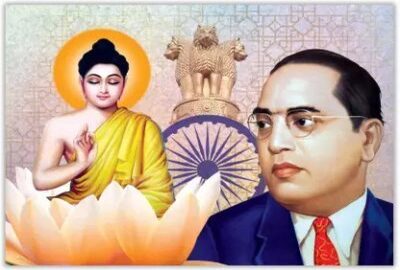On the night of April 13, 2025, Devi Shankar, a 35-year-old Dalit farmer from Isota Lohagpur village in Prayagraj’s Karchhana tehsili UP was brutally murdered and his body set on fire in an orchard. The horror of this violence is staggering. But perhaps what is more disturbing is the casual rhythm of how such events are processed or rather, erased in India’s caste infested justice system.
Police have confirmed that seven dominant caste men including six from the same family have been booked for the crime following a “heated argument.” Six men are merely detained for questioning one entire day. This is not inaction. This is caste privilege functioning as law.
Later 8 were arrested namely Dilip Singh, Mohit Singh, Manoj Singh, Awadhesh Singh, Vimlesh Gupta, Shekhar singh, sanjay singh and Ajay Singh said DCP of Police Vivek Chandra Yadav.
Also Read : Dr. B.R. Ambedkar and the Reserve Bank of India: The Forgotten Intellectual Architect
Let us be clear that this is not a dispute. This is not a “clash” or “row” as newspapers may put it. This is a caste atrocity. A Bahujan man’s body was reduced to ash, but the system still shields his Savarna killers. The political class remains silent. The chief minister who is quick to tweet condolences when cows die has offered no word on this murder. The silence is strategic. It is complicit. It is casteist.
Devi Shankar was not killed in isolation. His death is not a coincidence. It is an outcome of centuries of caste hate, sharpened by the impunity that the state gifts to dominant caste perpetrators. He was a farmer. A Dalit. He lived on the margins of land, dignity, and law. And the moment he crossed a line perhaps by speaking back, or simply existing in defiance he was turned into a spectacle of ash.
The location of this murder matters. Prayagraj a city renamed to erase its Mughal past is now branded as a bastion of Hindutva. In its ghats, temples, and administration, the logic of purity reigns supreme. In such spaces, the Dalit body is a permanent pollutant. It must be erased. Burned. Vanished. This is not a metaphor. This is the policy. This is cultural logic turned into everyday brutality.
Every inch of the state’s response screams caste allegiance. The police’s delay in making arrests is not about procedure. It is a form of permission. A message to the Dalit: protest, and we will bury you under paperwork and silence.
This silence is not neutral. It is deliberate. It echoes in courtrooms, newsrooms, and police stations. And the rest of India listens and learns: Dalit life can be extinguished without consequence.
Also Read : Dalit Girl Forced to Write Exam Outside Classroom During Her Period
The Numbers Tell a Bloodied Story
According to the NCRB’s 2023 report, Uttar Pradesh recorded 13,387 cases of crimes against Scheduled Castes the second highest in the country after Rajasthan. These include murder, rape, assault, and land grabbing. But these are only the registered cases. Every Dalit activist knows: what is reported is the tip of the iceberg. What is silenced is the system.
The 2023 Status Report on Dalit Human Rights by the National Campaign on Dalit Human Rights (NCDHR) observed that more than 60% of atrocities against Dalits go unreported due to fear, police apathy, and social retaliation. The report further notes that conviction rates in caste atrocity cases under the SC/ST (Prevention of Atrocities) Act remain abysmally low under 30%, while pendency rates remain dangerously high, with many cases dragging on for 5–10 years without resolution.
So, what message does this send? That Dalit bodies can be killed, raped, set on fire—and no meaningful justice will follow. In many instances, human rights defenders who support the families of victims face threats, false cases, and surveillance. The state, instead of protecting the oppressed, often protects the perpetrators.
Also Read : Voice of Resistance : Telangana Group-I Aspirants raise their voice against the Congress government for social Justice…
This is Not a sigle incident.
In 2020, a 19-year-old Dalit woman from Hathras was gangraped and murdered by dominant caste men. Her body was forcibly cremated by the police in the dead of night, without the family’s consent. Her killers walked free afterwords but the family members still in house arrest in the name of protection.
In 2021, a Dalit boy in Jalore, Rajasthan, was beaten to death by a teacher for drinking water from an “upper-caste pot.”
In 2022, two Dalit sisters in Lakhimpur Kheri were raped, murdered, and hung from a tree, echoing the 2014 Badaun horror. The cases not gave proper attention and neglected and alleged as “family matters” by politicians and media alike. These are not exceptions. These are caste rules in motion.
This is why this number of murder must not be reduced to numbers but countless.
It must not be buried under euphemisms. We must name it is caste lynching. A Brahminical killing. A hate crime. An act of war by the dominant caste against the Dalit poor.
Why Is There No National Outrage?
No special investigation team. No national commission visit. No breaking news debates.
No opens by Savarna intellectuals. Why?
Also Read : P.K. Rosy: The Forgotten Luminary of Malayalam Cinema
Because Devi Shankar was not rich. Not famous. And there is caste barrier. He was a Dalit. A farmer. A man whose death would not affect the stock market or the state election results.
Because caste privilege does not just a shield but its very normal everywhere against underprivileged. It decides whose deaths matter.
When a Dalit is burned in 2025, it is not an isolated event. It is the very heartbeat of this caste-Hindu nation. The state’s silence, the media’s apathy, and society’s indifference all come together to write the final chapter in his story: unimportant. Disposable. Dead.
Dalit Must Resist this Erasure
Must say aloud what this country fears: caste is not a relic of the past. It is the skeleton of the state.
To fight for justice in this land is not to file a complaint. It is to shout into a system designed to break your voice. “But we must shout. We must write. “We must rage.
Because if we don’t, they will burn another Devi Shankar tomorrow. “And the day after. And the day after that.”
Until every Dalit body is seen as sacred, until every dominant caste killer is punished without delay, until the system itself is broken and rebuilt without Brahminism at its core dalits are not possessing power in this democratic country. They are just a graveyard pretending to be a nation.
By Bindu Ammini, Advocate, Writer, Dalit Feminist & Legal Advisor of Dalit Times



